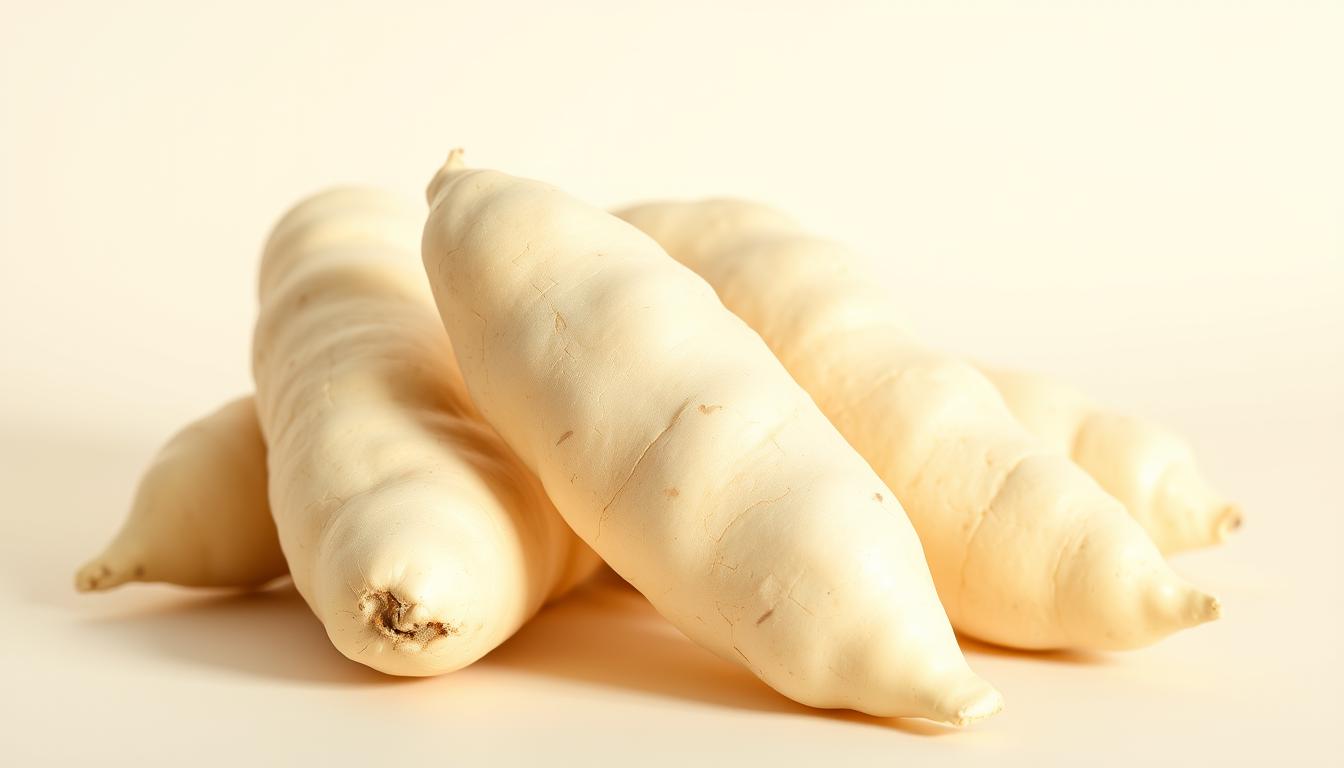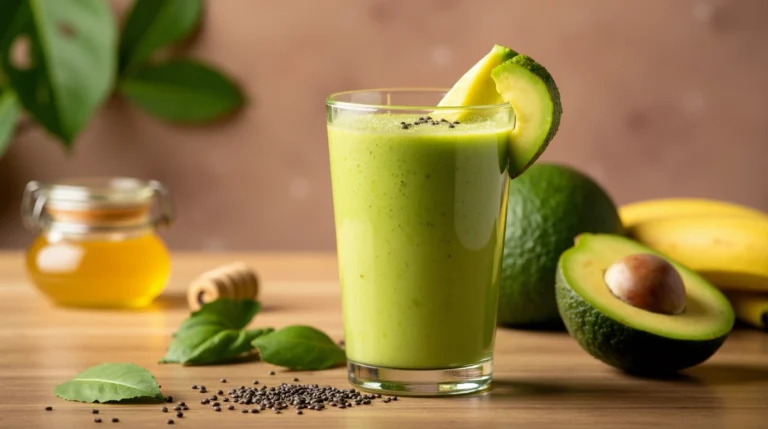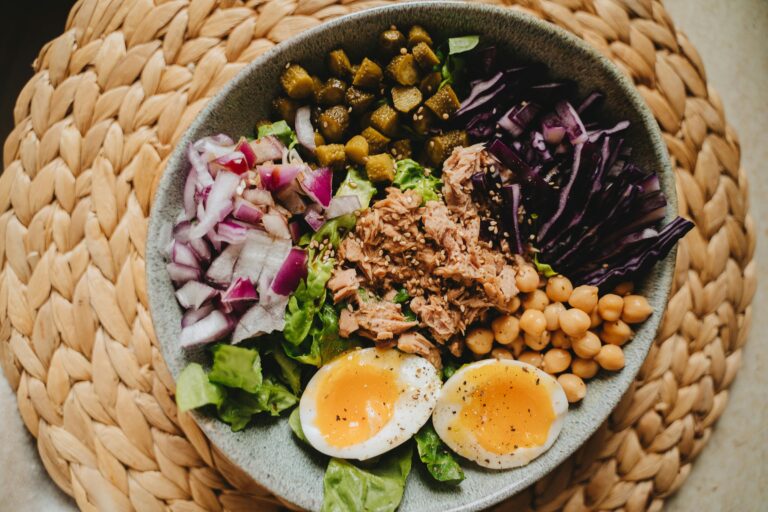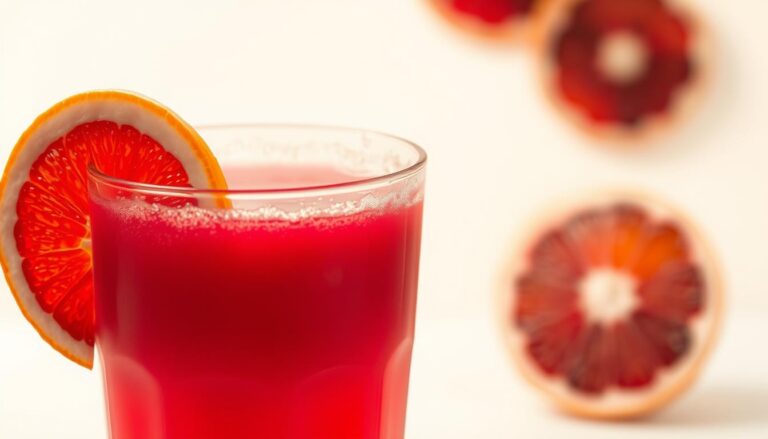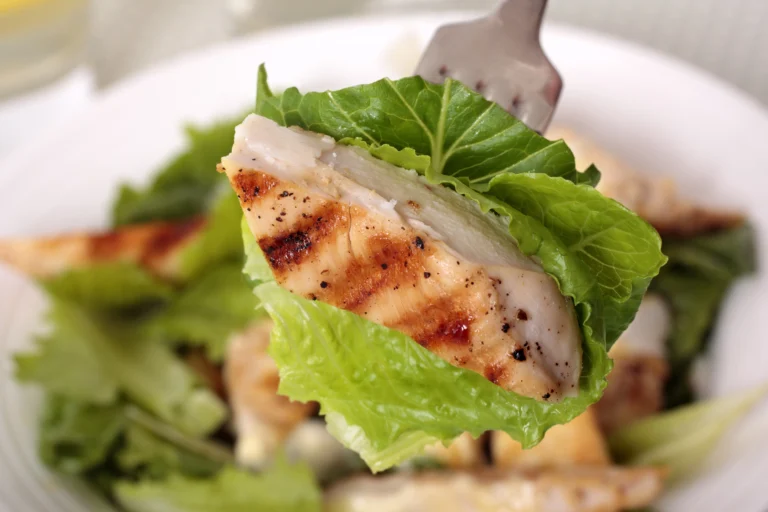White Sweet Potatoes: A Healthy & Tasty Choice
Growing up in North Carolina, I never thought a simple root could change my eating habits. White sweet potatoes became my go-to for healthy meals. They added a tasty twist to my usual potatoes.
White sweet potatoes are more than just a veggie. They come from Central and South America, over 5,000 years ago. They’re packed with nutrients, offering a sweet and creamy taste unlike regular potatoes.
North Carolina leads in sweet potato production since 1971. They’ve mastered growing these amazing tubers. White sweet potatoes are great for those looking for less sugar or more nutrients. They’re a healthy addition to any kitchen.
Table of Contents
Understanding White Sweet Potatoes
White-fleshed sweet potatoes are amazing tuber crops that bring a new twist to cooking. They are loved by food lovers and health experts for their tasty taste and health benefits. They are a great choice compared to regular potatoes.
Exploring white sweet potatoes opens up a world of tastes and traits. These versatile crops have a rich history that spans many places and cultures.
Exploring Varieties
There are many types of white sweet potatoes, each with its own special features:
- Japanese Sweet Potato (Muraski): Known for its purple skin and white flesh
- Hannah Sweet Potato: Featuring a creamy white interior with light tan skin
- O’Henry Sweet Potato: Characterized by its bright white flesh and smooth texture
Historical Origins
The story of white sweet potatoes starts in the Americas. Native people first grew these healthy root vegetables. Archaeological finds show they’ve been a key food for thousands of years.
“White sweet potatoes represent more than just a food—they’re a cultural connection to ancient agricultural practices.” – Agricultural Historian
Physical Characteristics
| Characteristic | Description |
|---|---|
| Skin Color | Ranges from light tan to purplish |
| Flesh Color | Cream to bright white |
| Size | Typically 4-6 inches long |
| Texture | Creamy and slightly dry |
When picking white sweet potatoes, choose firm ones with smooth skin. Fresh ones will have a milky white substance, showing they are sweet and of good quality.
Nutritional Profile and Caloric Content
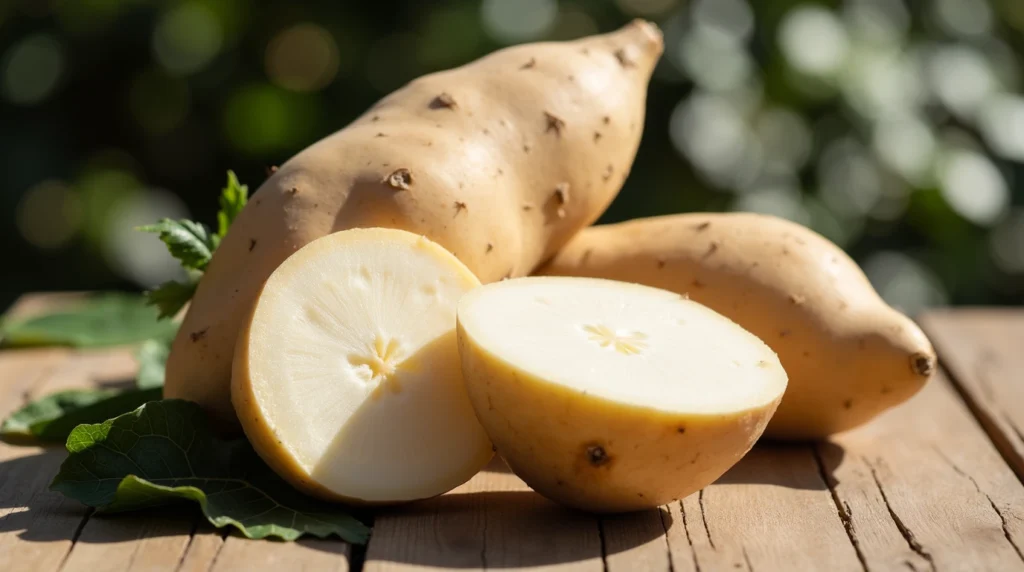
White sweet potatoes are packed with essential nutrients. They are a great choice for your diet. A large sweet potato has about 162 calories.
Let’s look at what makes these tubers so good for you:
- Macronutrient Breakdown:
- Carbohydrates: 90%
- Protein: 9%
- Fat: 1%
- Micronutrient Highlights:
- Vitamin A: 1,730 mcg
- Vitamin C: 35.3 mg
- Potassium: 855 mg
White sweet potatoes are great for a balanced diet. They have low fat and high fiber, helping with digestion and energy.
| Nutrient | Amount per Large Sweet Potato |
|---|---|
| Total Carbohydrates | 37g |
| Dietary Fiber | 3.9g |
| Protein | 3.6g |
| Total Fat | 0.1g |
White sweet potatoes are a nutritional powerhouse. Their glycemic index varies, making them flexible for different diets. They are a valuable part of your daily nutrition.
Health Benefits of White Sweet Potatoes
White sweet potatoes are packed with health benefits. They are nutritious and support your overall health. They can also help manage blood sugar levels.
White sweet potatoes are great for people with diabetes. They have a unique nutritional profile. This makes them excellent for health.
Vitamin and Mineral Powerhouse
White sweet potatoes boost your immune system. They are full of vitamins and minerals. These nutrients support your overall wellness.
- Vitamin A for eye health
- Vitamin C to strengthen immunity
- Vitamin B6 for metabolic functions
- Potassium for heart health
Digestive Health and Fiber
White sweet potatoes are good for your digestive system. They have a lot of fiber. A medium-sized potato has about 4 grams of fiber.
- Improving gut health
- Promoting regular digestion
- Supporting weight management
Antioxidant Protection
White sweet potatoes are full of antioxidants. These compounds fight off harmful free radicals. They help reduce inflammation and support long-term health.
| Nutrient | Amount per 100g | % Daily Value |
|---|---|---|
| Vitamin A | 709 mcg | 78% |
| Vitamin C | 2.4 mg | 4% |
| Fiber | 3.0 g | 12% |
| Potassium | 337 mg | 10% |
White sweet potatoes have a lower glycemic index than regular potatoes. This makes them a good choice for keeping blood sugar levels stable. They are delicious and packed with nutrients.
White Sweet Potato vs Regular Sweet Potato
Exploring sweet potato varieties, we find white and orange sweet potatoes with unique traits. Knowing about these nutritious potatoes helps us make better food choices.
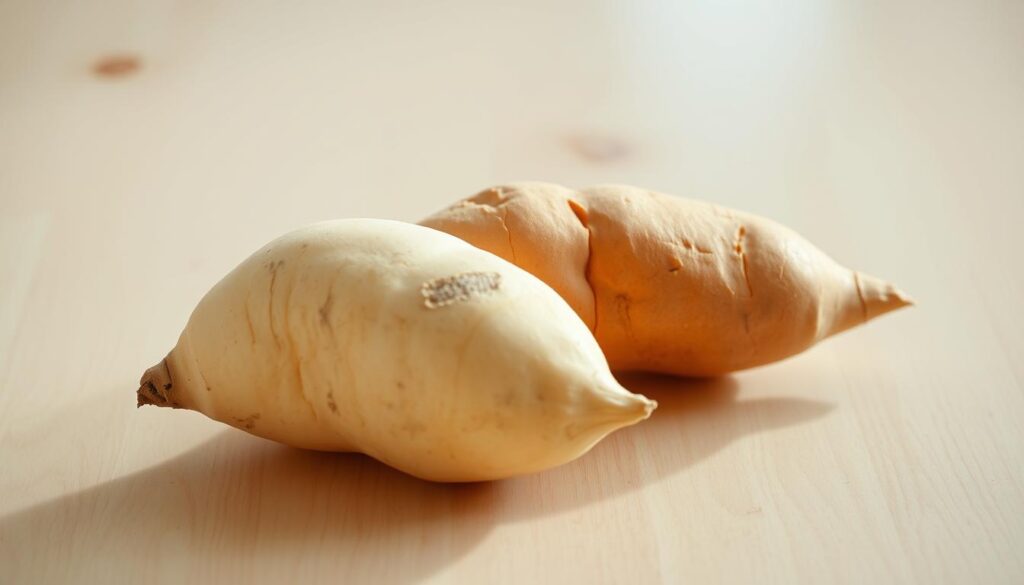
- Texture: White sweet potatoes are less moist and more starchy
- Flavor: They have a milder, borderline nutty taste
- Cooking Performance: They caramelize exceptionally well in the oven
Nutritional comparisons show interesting facts about these sweet potatoes:
| Nutritional Aspect | White Sweet Potato | Orange Sweet Potato |
|---|---|---|
| Carbohydrates (per 100g) | 19.7g | 17.9g |
| Protein (per 100g) | 1.2g | 1.9g |
| Sugar Content (per 100g) | Lower | Higher (11.6g) |
White sweet potatoes are a versatile choice compared to orange ones. They have less sugar and a unique taste. This makes them great for those looking for a different kind of nutritious potato.
The glycemic index of white sweet potatoes is slightly lower. This is good for people watching their blood sugar. Their starchy nature is perfect for roasting and caramelizing, adding flavor to many dishes.
Cooking Methods and Preparation
White sweet potatoes are great for many cooking methods. They can become delicious baking potatoes for your Thanksgiving sides. Learning about different ways to cook helps you get the most flavor and nutrition.
Trying out different cooking techniques can really bring out the best in white sweet potatoes. Each method gives you a unique texture and taste. This can make your meals even more special.
Roasting and Baking Techniques
Roasting white sweet potatoes makes them sweeter. Here’s how to do it right:
- Preheat oven to 425°F
- Wash and cut potatoes into even-sized pieces
- Toss with olive oil and seasonings
- Bake for 30-45 minutes until tender
Steaming and Boiling Methods
Steaming keeps more nutrients than boiling. Quick tip: Cut potatoes into uniform chunks for even cooking and reduced preparation time.
Air Frying Tips
Air frying makes potatoes crispy with little oil. Here’s what to do:
- Set air fryer to 360°F
- Cut potatoes into consistent cubes
- Cook for 15 minutes, tossing every 5 minutes
- Season with herbs like rosemary or chili powder
“Cooking is about passion, so it may look slightly temperamental in a way that it’s too assertive to the naked eye.” – Gordon Ramsay
Each cooking method has its own benefits for white sweet potatoes. Try them out to find your favorite way to make memorable Thanksgiving sides.
Storage and Shelf Life
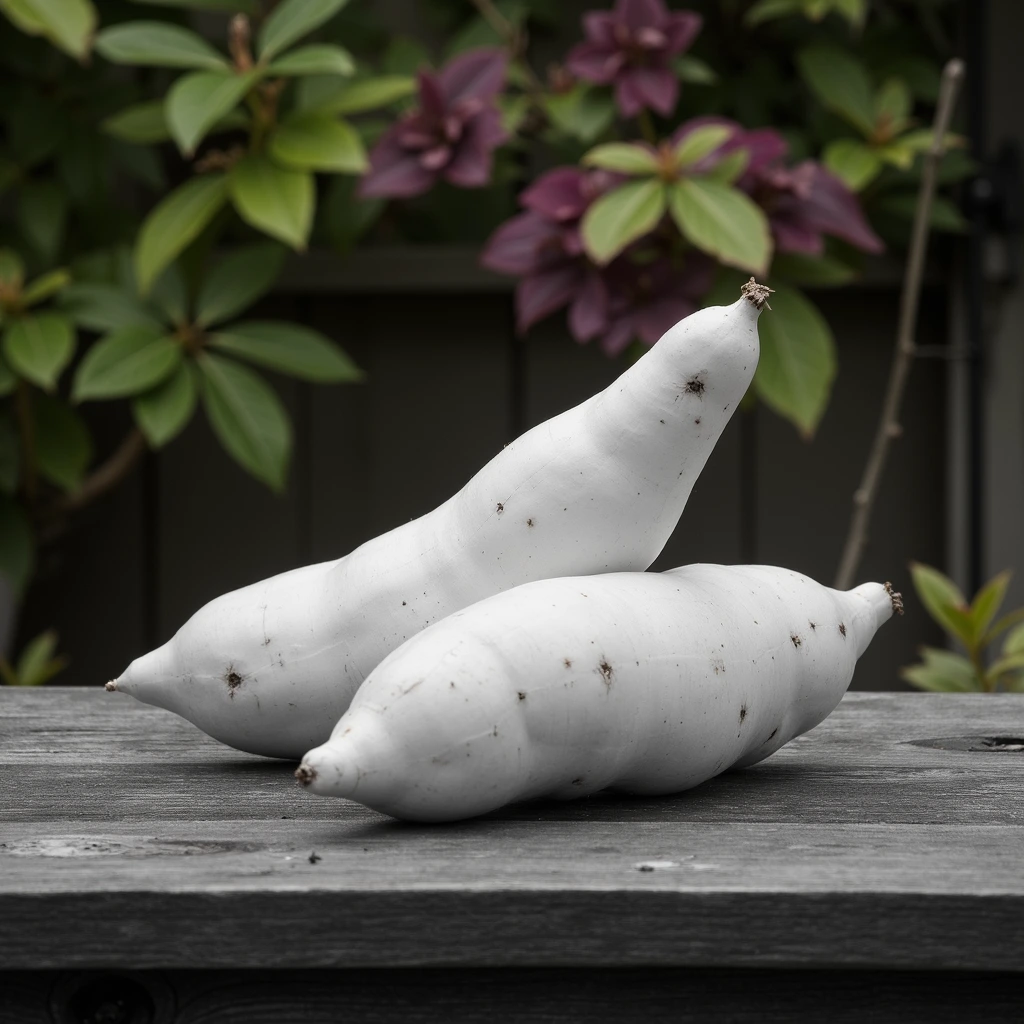
Storing root vegetables like white sweet potatoes is key to keeping them fresh. These starchy veggies need the right storage to stay tasty and nutritious. Here’s how to keep them in top shape.
For whole white sweet potatoes, pick a cool, dark spot. The best temperature is between 55 to 60 degrees Fahrenheit. Don’t put them in the fridge, as cold can ruin their taste and texture. A pantry or root cellar is perfect for keeping them fresh.
- Store in a well-ventilated area
- Keep away from direct sunlight
- Maintain consistent temperature
- Avoid storing near ethylene-producing fruits
Raw white sweet potatoes can last up to one month if stored right. On the kitchen counter, they stay fresh for about two weeks. Here’s how to keep them fresh longer:
- Check for any soft spots or sprouts before storing
- Do not wash before storage to prevent moisture buildup
- Inspect regularly for signs of spoilage
For cooked white sweet potatoes, the fridge is essential. Store them in an airtight container for 3 to 5 days. Freezing cooked sweet potatoes is also great – they can last up to 6 months.
Watch for signs of spoilage such as:
- Mushy or wrinkled skin
- Unusual odors
- Discoloration
- Large sprouts
By following these storage tips, your white sweet potatoes will stay fresh and delicious. Enjoy them in your favorite dishes.
White Sweet Potato in Different Cuisines
White sweet potatoes are loved by chefs and home cooks worldwide. They bring a unique flavor to many dishes. This makes them a favorite in many cuisines.
Asian Culinary Traditions
In Asian cooking, white sweet potatoes are a favorite. They’re used in many creative ways. You’ll find them in:
- Creamy sweet potato noodles
- Delicate tempura dishes
- Hearty stews and side dishes
American Southern Cooking
In Southern cooking, white sweet potatoes are a key ingredient. They’re used in many dishes, especially at Thanksgiving. They add a special touch to family meals.
Southern cooks love white sweet potatoes for their sweet taste and creamy texture.
Modern Culinary Applications
Today’s chefs are getting creative with white sweet potatoes. They make:
- Gourmet purees
- Innovative plant-based desserts
- Sophisticated appetizers
| Cuisine Type | Popular Preparation | Unique Characteristic |
|---|---|---|
| Asian | Sweet Potato Noodles | Delicate Texture |
| Southern American | Thanksgiving Casserole | Creamy Consistency |
| Modern Fusion | Gourmet Purees | Culinary Innovation |
Whether you’re making a classic dish or trying something new, white sweet potatoes are perfect. They offer endless possibilities for creative cooking.
Conclusion
White sweet potatoes are a great choice for a healthy diet. They are packed with nutrients and good for people with diabetes. They offer many health benefits.
Cooking with white sweet potatoes is fun and healthy. They have a lower glycemic index than regular sweet potatoes. This helps control blood sugar levels.
They are also high in fiber, which helps with weight and digestion. Plus, they give you important vitamins and minerals.
White sweet potatoes are easy to cook in many ways. You can roast, bake, or steam them. They have a mild taste that works well in many dishes.
Adding white sweet potatoes to your meals can make your diet more interesting. They support your health goals. Try new recipes and see how they can improve your meals.

